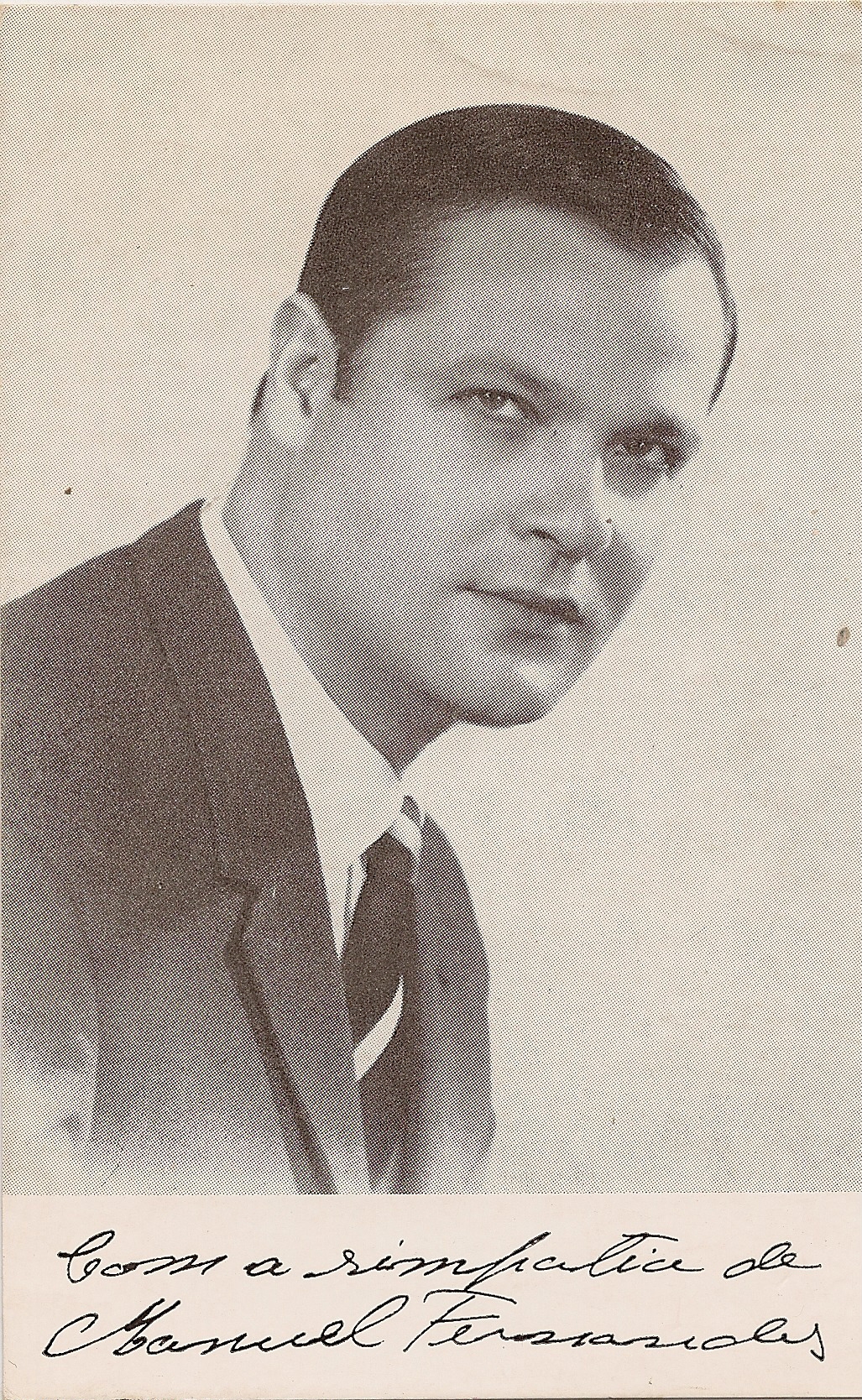Know more:
Manuel Fernandes
(N. 9 December, 1921 - M. 20 May, 1994)Manuel Fernandes was born in Lisbon, in the parish of Santa Isabel of the Campo de Ourique neighbourhood on the 9 December 1921.
He attended elementary school at the parish he was born in and then he moved with his parents to Alcântara. His family stayed there only until he was 7 years old, and then returned to Campo de Ourique.
After completing his 2nd degree exam, at 11 years old, he went to the boarding school Oficinas de S. Jose, working there for one year and learning the topography trade. He then took a job at the company Pires & Comandita and later moved to Papelaria Fernandes.
His artistic vein became apparent when he was 5 years old and improvised shows “holding a broomstick”. He kept singing and whistling and even became known as the “whistle king”. He performed for the kids and also the adults, and was always applauded. (cf. “Álbum da Canção”, 1 October 1964).
In 1936, at only 15 years old, he had already sung as an amateur in taverns and popular associations where Fado was usually performed on weekends.
Tempted to follow an artistic career due to all the compliments he received, he looked for Filipe Pinto, at Retiro dos Marialvas. It was there that the entrepreneur José Miguel, encouraged by the singer Maria Carmen, who thought Manuel Fernandes had a nice voice and looked like Manuel dos Santos (a famous singer who left for the USA), invited him to sign at the Santa Catarina Night Feast.
In 1938, only 17 years old, Manuel Fernandes began his professional career as a fado singer earning 15 escudos a night. He still kept his job as a typographer until it became impossible to combine it with the nocturnal fado performances.
He later started singing at Solar da Alegria and Café Mondego, on invitation of the entrepreneur José Miguel, and then joined the casts of Luso and Marialvas, until he established himself at the typical restaurant Folclore for a long time.
In April 1941, Manuel Fernandes appears in the cover of the newspaper “Canção do Sul”, which demonstrates is popularity in the fado universe at only 19 years old.
In 1944, six years after his debut, he performed a small part at the opereta "Os Magalas" where he sang impromptu with Hermínia Silva and Carlos Ramos. After the stage, he returned to fado houses, combining it with live performances on the radio, especially Emissora Nacional.
He will perform at two other theatre productions: the opereta "Rosinha dos Limões", presented at Coliseu dos Recreios, and the vaudeville play “Muitas e Boas”.
In 1946, Manuel Fernandes married Adelaide Cardoso, who was also a fado singer known as the “Girl from Alfama”. The couple had two daughters who they named Isaura and Maria Manuel. To celebrate his first daughter’s birth, the fado singer wrote the theme “Vassourinha”, which became one of his greatest hits.
In 1953 he travelled abroad for the first time, hired to perform in Brazil where he stayed for three months, singing in São Paulo, at “Adega do Douro”, radio shows and even recording his first record.
After his return he was invited to join the cast of "Os Companheiros da Alegria ", na artistic group ran by the actor and radio presenter Igrejas Caeiro, which accompanied the Portuguese Cycling Tour and performed in the places the stages ended. Due to the enormous success during the “Tour”, the group continues to perform around the country.
In 1957, the fado singer was one of the artists selected to represent Portugal at the Latin Song Festival, in Genova. Three years later, invited by Odir Odilon, he began a tour in Africa accompanied by Cidalisa do Carmo and the pianist Tobias. However, due to personal differences with the organizer he cut the tour short.
On the 4 May 1962 he celebrated his career’s 25th anniversary with a big party in Coliseu dos Recreios.
Manuel Fernandes had a very active professional and diversified life, performing on fado houses, the radio and, after the inauguration of RTP, on TV. He toured on the Portuguese islands, Angola, Mozambique, France, Brazil, England, South Africa, U.S.A. and Canada.
In the mid-1980s the fado singer stepped away from the stages and retired from the artistic career, claiming he would rather be missed than heard without his past glory. (cf. “DN Magazine”, 16 April 1989)
Manuel Fernandes died on the 20 May 1994, leaving his mark on a discography of over 70 records; he even recorded two LPs with the fado singers Maria Marques and Maria do Espírito Santo for an American label.
Source:
“Canção do Sul”, 1 April 1941;
“Guitarra de Portugal”, 1 December 1945;
“Ecos de Portugal”, 1 January 1948;
“Àlbum da Canção”, 1 October 1964;
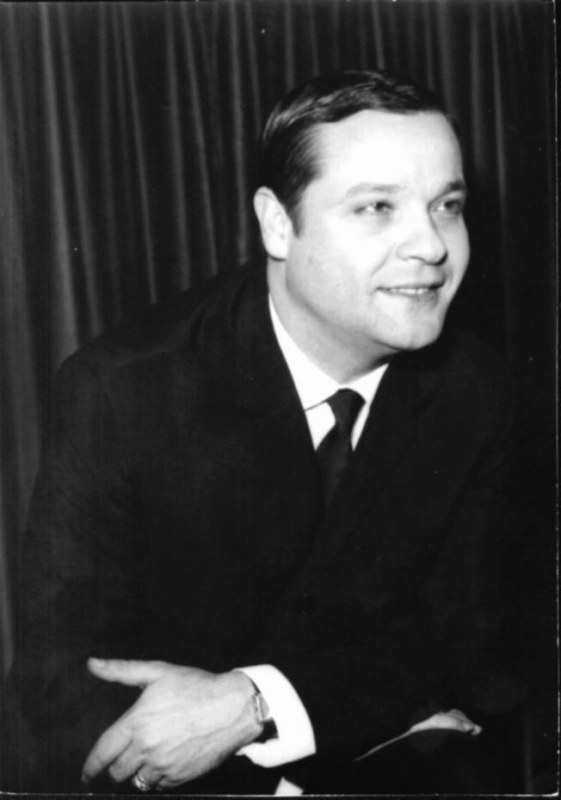
Manuel Fernandes, s/d.
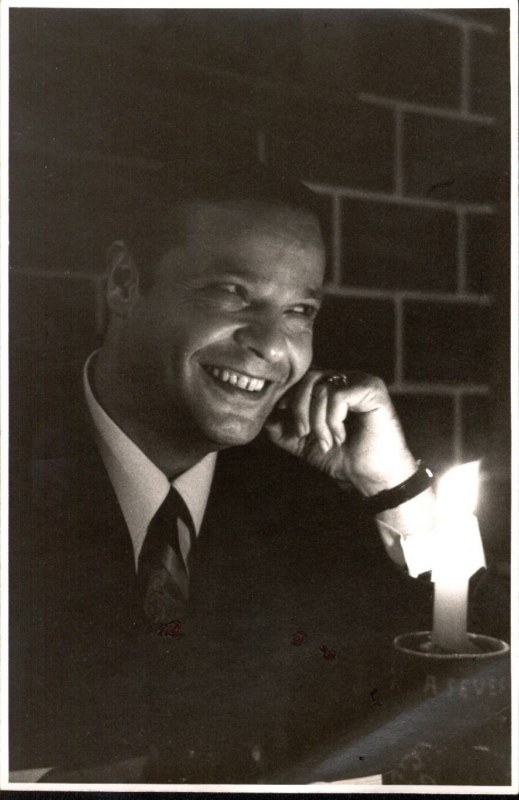
Manuel Fernandes, s/d.
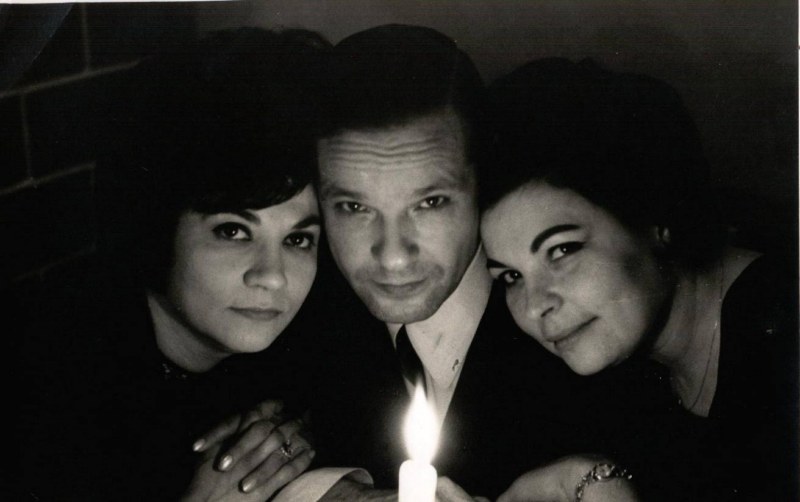
Alice Maria, Manuel Fernandes e Maria José da Guia Adega Machado, s/d.
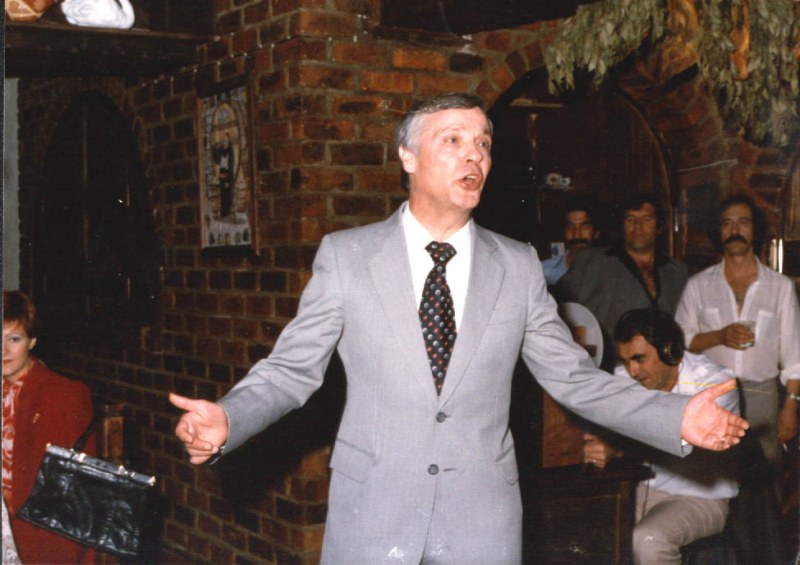
Manuel Fernandes África do Sul, 1983
-
A Vassourinha Manuel Fernandes (Domingos Gonçalves da Costa / Fado Menor)
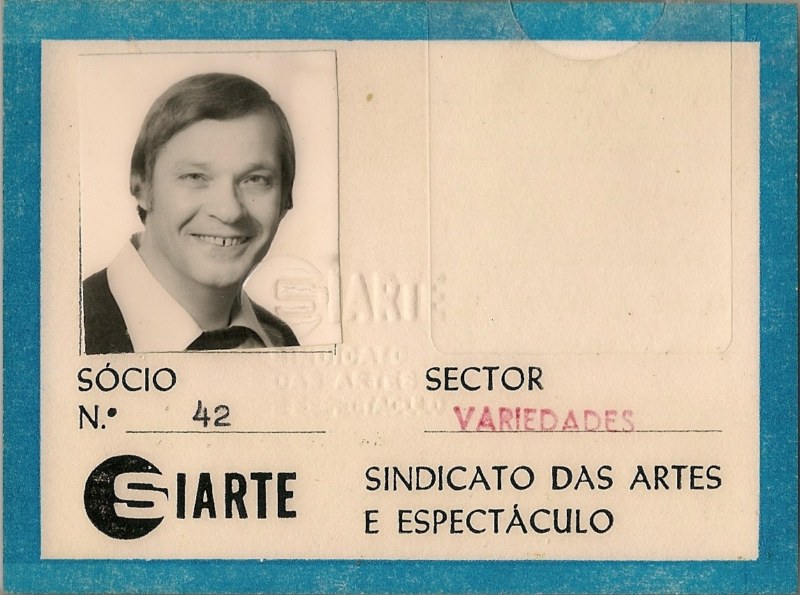
Cartão do Sindical | Trade Union Card, Manuel Fernandes, s/d.
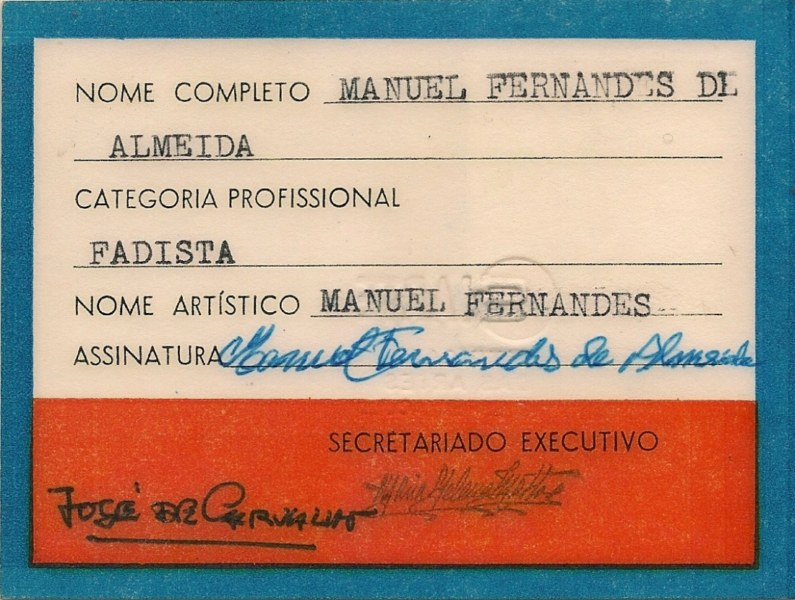
Cartão do Sindical | Trade Union Card, Manuel Fernandes, s/d.
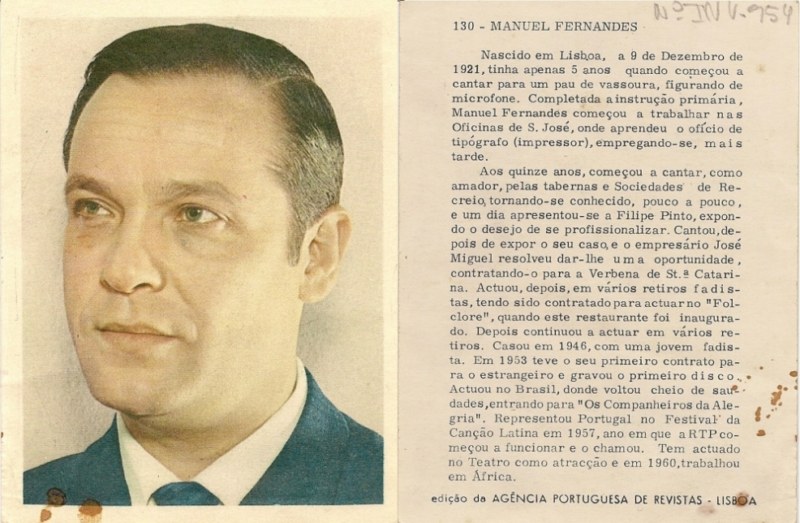
Cromo | Sticker, Manuel Fernandes, s/d.
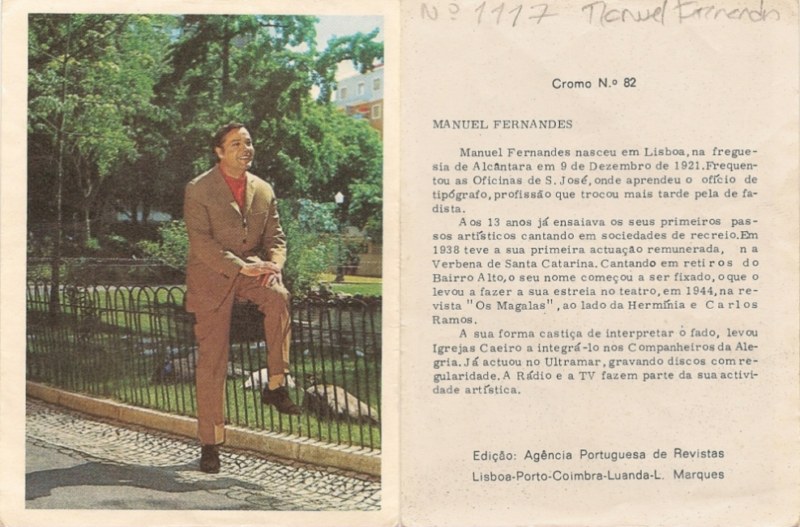
Cromo | Sticker, Manuel Fernandes, s/d.
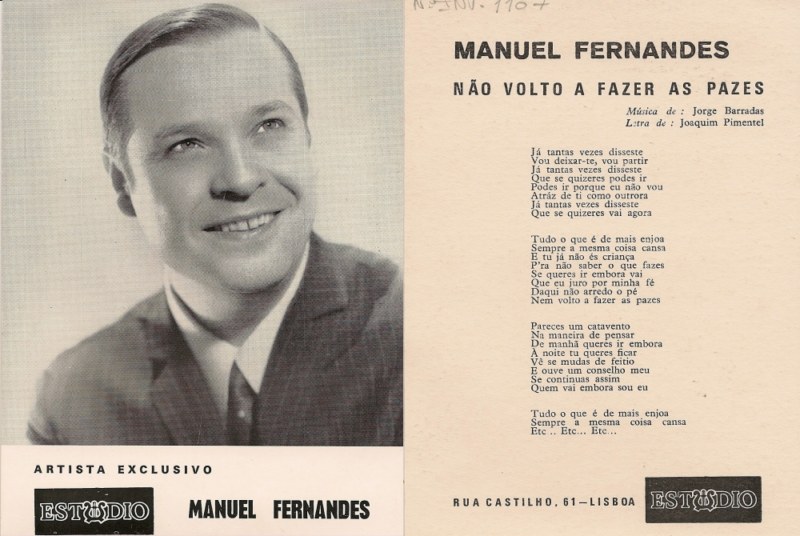
Postal de | Postcard Manuel Fernandes, s/d.
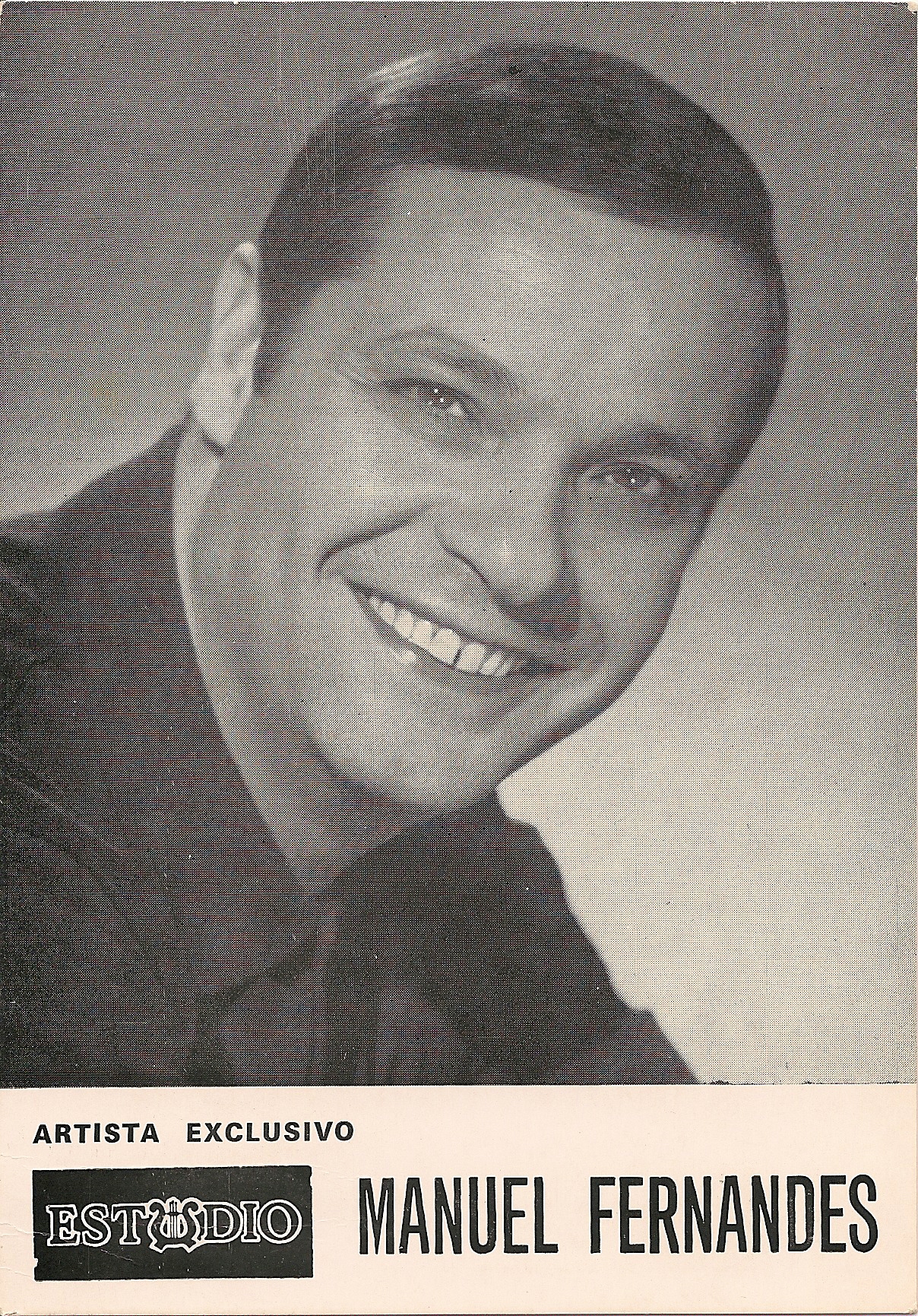
Postal de | Postcard Manuel Fernandes, s/d.
